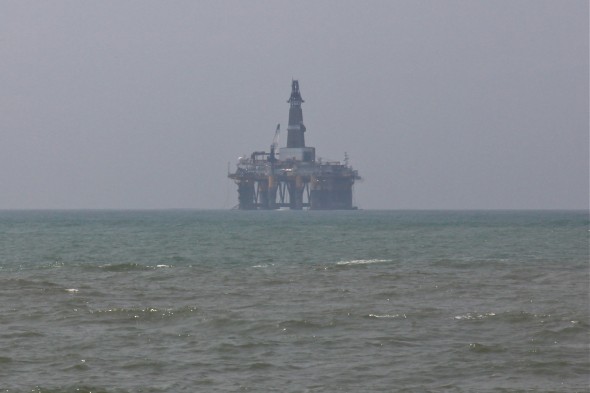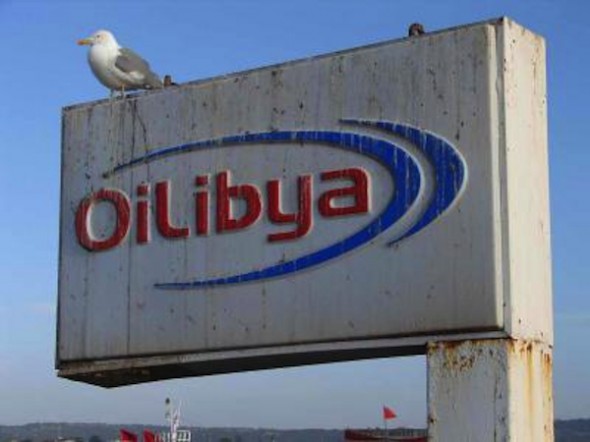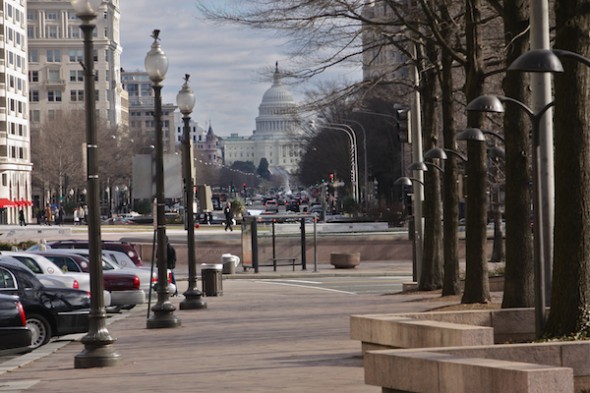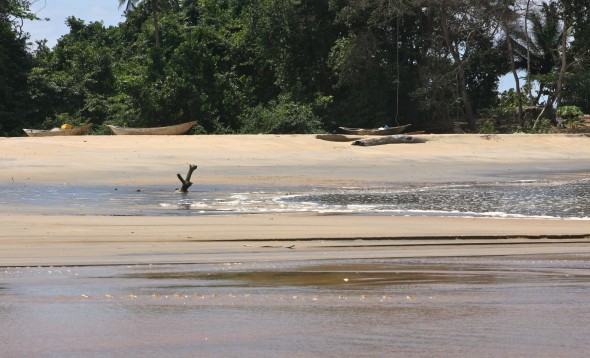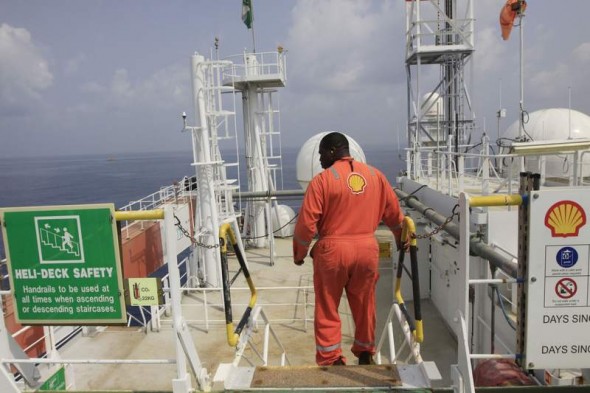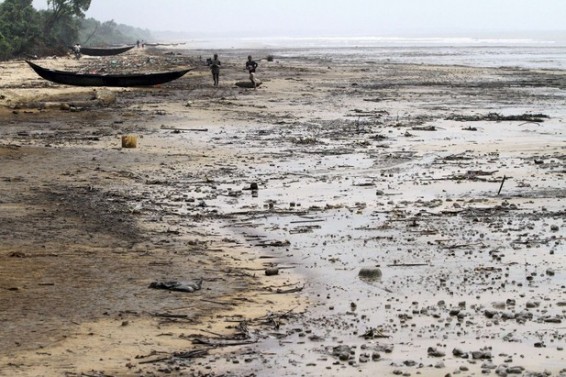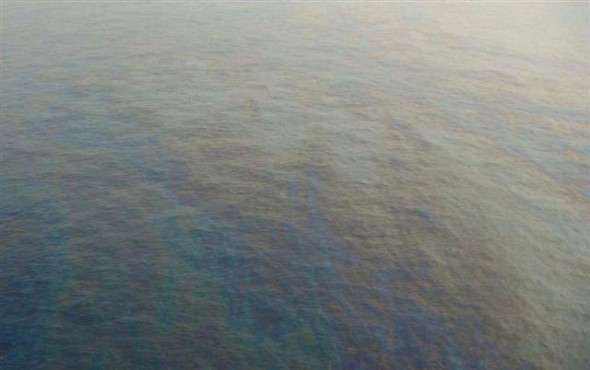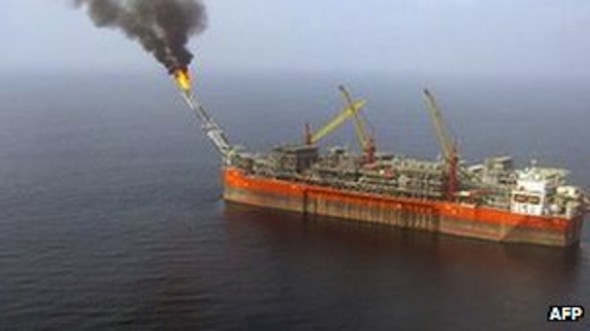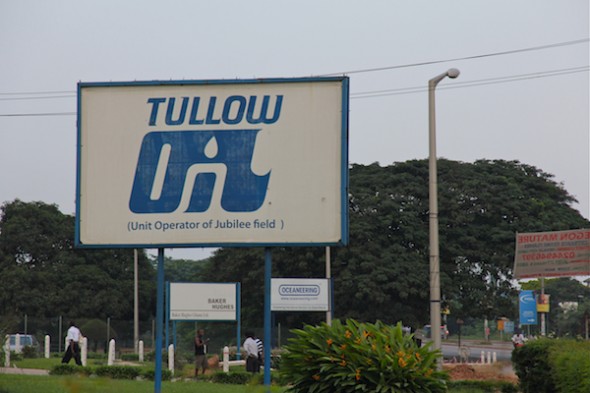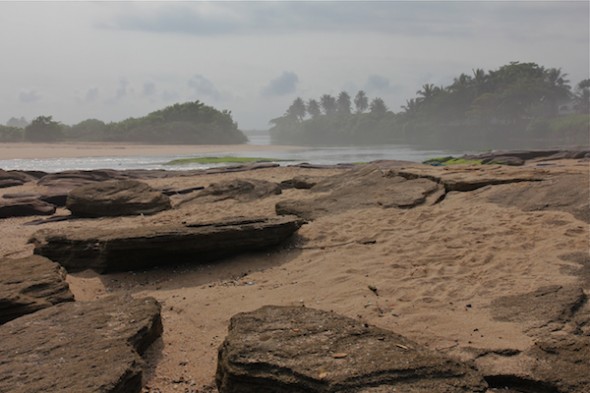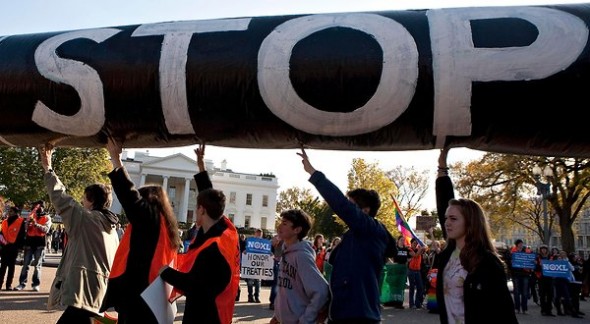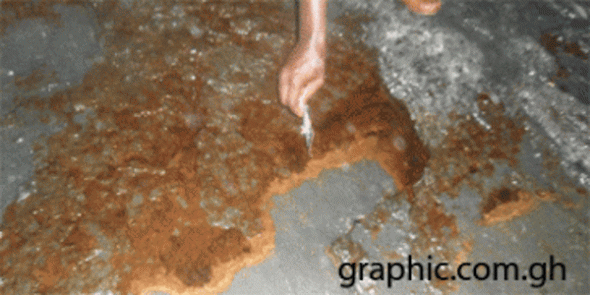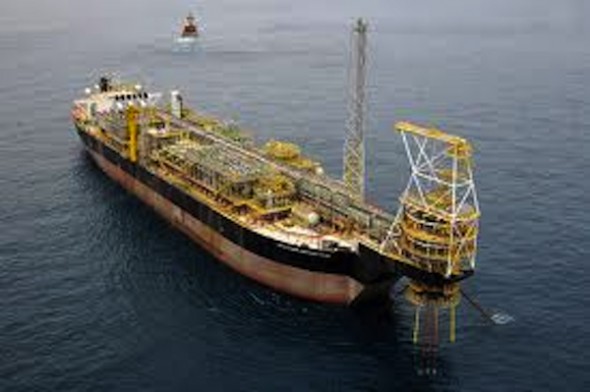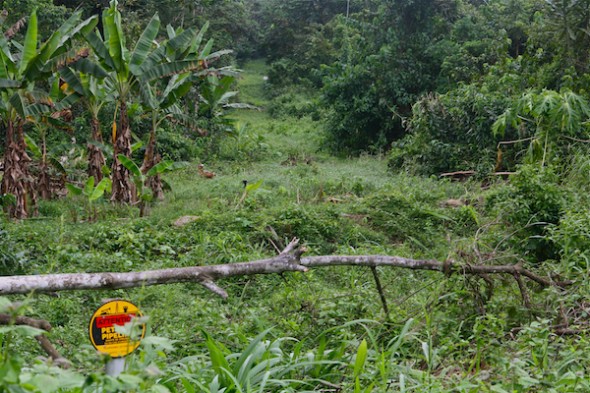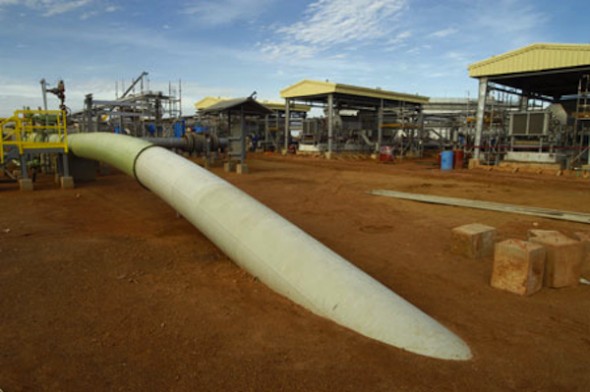Rigged?
Rigged? The Scramble for Africa’s Oil, Gas and Minerals. That’s the title of a new report out from Global Witness, the U.K. based anti-corruption campaigner.
The timing of the report’s publication – a call for increased transparency across the oil and gas industry – could not be better. At this moment, the oil industry is putting heavy pressure on the United States S.E.C. to weaken the parts of the 2010 Dodd-Frank financial reform that require S.E.C. listed corporations to disclose their payments to foreign governments.
Libya’s oil today: resource curse part two?
News today from Libya and Ghana.
ThinkAfricaPress has published, “Prospects for Libyan Oil: Learning from Iraq”, an interesting article on the future of the Libyan oil industry. Here’s an excerpt:
Increasing the transparency of dealings regarding the ‘black gold’ that lies beneath Libya will be essential to ensuring balanced growth and employment for the Libyan people, but this will prove no mean feat. Given that pressure is unlikely to come from external governments, the incentives and pushes for reform will have to be generated domestically through civil society and a free media.
When getting rid of Gaddafi was so important for U.S./NATO, there was much talk about his abuse of the country’s oil wealth. Now that he’s out of the picture, it’s like, “who cares?” As long as the oil flows…
By the numbers: giving stories the attention they deserve
“By the Numbers – the fight for oil and mining company transparency,” is a must-read item from Oxfam America’s Politics of Poverty blog (the post is also pasted below).
Some stories don’t get the attention they deserve. Important issues that are hard to translate into snappy news items are more often than not overlooked in today’s shallow “news” environment.
Remember the U.S. financial reform laws passed back in 2010? You know, the Dodd-Frank Act intended to prevent another financial meltdown? Well, one part of that reform package that hardly got any mainstream news attention was Section 1504, one of several “specialized corporate disclosure” provisions in Dodd-Frank. This item, also known as the Cardin-Lugar provision, was signed into law by President Obama in July 2010.
As the transparency advocacy organization, Publish What You Pay, explains, “The first of its kind, this law requires oil, gas and mining companies registered with the U.S. Securities and Exchange Commission (SEC) to publish their payments to the U.S. federal government and foreign governments as part of their annual reports to the SEC.”
Nigerian well blowout? Chevron to begin drilling relief wells
In the coming days I plan to post a few short pieces with additional information on offshore drilling oversight (or lack of), the subject of my recent article on iwatch news.
In the meantime, though, I want to put up a quick post about the Chevron rig that has been burning uncontrollably off the coast of Nigeria since January 16th.
Ghana’s fishing communities fear oil spills…
…And rightly so.
Yesterday I wrote that Ghana has been producing oil from its offshore Jubilee field since December 2010, yet still lacks monitoring vessels, equipment and personnel.
Something else that’s missing: funds to compensate fishing communities in the event of a spill.
This video recounts the fears of the residents of Abuesi, a small fishing community near Sekondi-Takorad (a.k.a. “Oil City”). Travel up and down the coast, and you’ll hear the same fears echoed again and again.
What will happen when a village that is entirely dependent on its fishing operations for its survival is shut down by an oil spill?
Is Ghana really ready for oil?
Is Ghana ready for an oil disaster? It’s difficult to find officials who want to talk about the subject. Most prefer saying things like, “We learned many lessons from the Deepwater Horizon spill,” and, “It can’t happen here.” Truth is (and everyone knows this), a disaster can strike anywhere.
Ghana has been producing oil from its offshore Jubilee field since December 2010, yet still lacks monitoring vessels, equipment and personnel. The country has an “oil spill response plan” — on paper — but could Ghana actually respond to and deal with a significant oil spill?
This video and a new article published today on iwatch news explore the state of Ghana’s environmental regulation and emergency preparedness.
Bonga spill investigation ordered
The Nigerian government has mandated an investigation into the cause and effect of the Bonga oil spill on December 20th.
An NGO has also raised questions regarding Shell’s use of dispersants without any monitoring or assessment plan.
Fishermen are blaming the spill for a dwindling fish supply and rising prices.
Meanwhile, Shell is moving ahead with its plans to drill in the Arctic waters off Alaska.
“The polluter is strangely in charge of the regulators.”
That’s a perfect line to sum up the oil industry in Nigeria.
Day two of the general strike and ongoing sectarian violence have pushed news of the Bonga field oil spill to the back pages, but in the end it’s all about oil. Whether it’s pollution on the beach, corruption or violence, the source of Nigeria’s malaise is oil.
But back to that line, “The polluter is strangely in charge of the regulators.” That’s from an editorial that appeared on January 9th in the Nigerian Compass.
Bonga field: Back to business as usual
LAGOS, Nigeria — Royal Dutch Shell PLC’s Nigerian subsidiary says it has resumed production at a 200,000 barrel-per-day oil field after containing the worst Nigeria offshore spill in more than a decade.
Spokesman Tony Okonedo said in a statement Thursday that steps had first been taken to ensure it was safe to restart production at the Bonga deep-water oil field.
That’s the word from the Associated Press. Reuters adds a bit more information:
Nigerian villagers say oil from the spill at Bonga, 120 km offshore, had washed up on the coast, blackening stretches of it and killing fish, but Shell has denied that the oil could be from the Bonga facility.
2012 off to a rocky start in the Gulf of Guinea
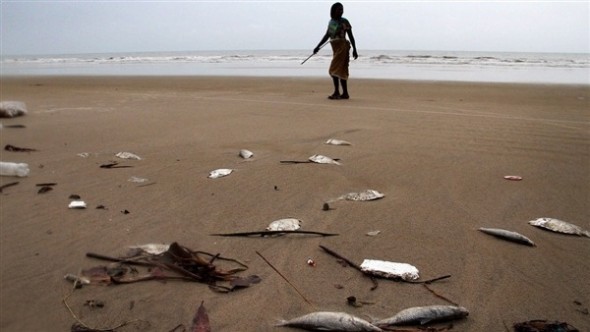
A woman walks past some of the hundreds of dead fish believed to have been killed as a result of the recent oil spill off the coast of Nigeria. Photo: George Esiri/EPA
The 40,000 barrel (1.68 million gallon) oil spill that occured sometime around December 20th at Shell’s Bonga facility 120 km off the coast of Nigeria has not been good for the new year.
Well, I should qualify: it hasn’t been good for Nigerians. Nigeria’s largest offshore spill (as opposed to onshore, where larger spills have certainly occurred) in more than a decade hasn’t made a dent in Shell’s stock price and is only getting minimal media coverage outside the country.
As I wrote a few days ago, Shell announced that clean up crews had “contained” the spill before it hit land. According to the company, clean-up crews, dispersants and nature worked together to prevent the spill from arriving onshore. At the same time Shell reported that clean-up crews had discovered a second spill — one that reached land — having nothing to do with the Bonga oil leak.
Shell continues to deny that the onshore mess has anything to do with the Bonga field spill, but many are doubting those claims. The amount of oil that has washed ashore looks substantial (Euronews has produced a short video report that includes villagers showing barrels of oil they’ve shoveled up: Coastal pollution fears after Nigeria oil spill). Could this really be the result of a passing tanker spill/dump? Shell said the company would analyze the oil on the beach to prove it has nothing to do with the Bonga facility.
More Nigeria news from SkyTruth
Why do we hear so little about spills in the Gulf of Guinea region? Well, there are the officials and companies who don’t (seem to) give a damn. There are the restrictions on the press in a number of countries and the lack of resources for journalists across the region that hamper in-depth reporting. But there’s also the fundamental lack of oversight: we don’t hear much because the governments themselves don’t know much. They don’t have monitoring systems and are — far too often — at the mercy of the oil companies when it comes to getting information about spills and clean-up.
SkyTruth, an organization that seeks to create environmental awareness through the use of satellite imagery (“If you can see it, you can change it”), has been posting regular updates on the recent Bonga spill.
I’m reposting links to the last two pieces from SkyTruth, which get at several crucial points regarding the Gulf of Guinea: No one knows what’s going on because of the lack of monitoring and oil is being spilled or dumped all the time in the region. Remember the spill off the coast of Ghana in November? Was it from the Jubilee operations or a passing tanker? Who knows?
Continue reading . . .
Did someone say oil spill?
As the spill offshore Nigeria works its way to shore, the lack of information about what is actually happening is depressingly familiar.
Shell reports that less than 40,000 barrels were spilled (at 42 gallons per barrel, that’s something like 1.6 million gallons), but there’s no way to verify that information. Shell posted a photo of the source of the spill, a rupture in the line that carries oil from the offshore storage facility (the FPSO) to oil tankers.
Oil spill offshore Nigeria
News from Nigeria:
Nigeria in Race to Limit Shell Oil Spill
Lagos – Authorities rushed to prevent one of Nigeria’s worst recent oil spills from reaching the West African nation’s shoreline on Thursday, with production from a major Shell field also shut due to the leak.
Shell, which said the leak has been stopped, has estimated that less than 40 000 barrels of crude have spilled into the sea and was deploying ships with dispersants to attack the slick. Planes were also being mobilised.
It was Nigeria’s worst offshore spill since a 1998 Mobil incident, officials said, though onshore leaks have been estimated at levels far worse since that time in the oil-producing Niger Delta.
One year already…
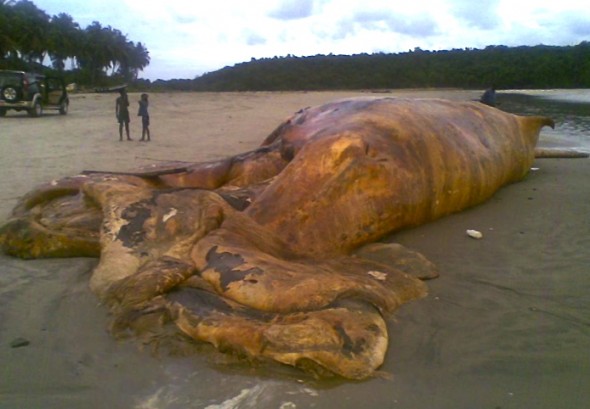
The eighth dead whale to wash ashore in the Western Region since late 2009. The Ghana EPA says there's no connection to oil drilling, but doesn't offer any details to back up the assertion. Photo courtesy of Friends of the Nation.
Yes, Ghana has been an oil producing nation for one year now.
One year on and where do things stand? In terms of environmental oversight, not much has changed and there remains much progress to make.
What’s killing the dolphins?
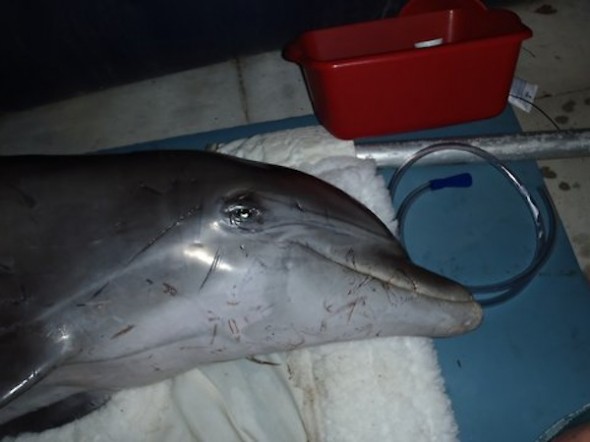
An injured dolphin as it appeared when rescued in Alabama last week. Photo: Institute for Marine Mammal Studies
I read an interesting post in the New York Times Green blog about the dolphin die-off in the Gulf of Mexico. Since early 2010 dead dolphins have been washing ashore at an alarming rate and among the many possible explanations for the 600 dead dolphins is — of course — the BP oil spill. According to the article, which I’m pasting below, scientists are not yet able to determine the cause of the die-off.
This made me think of the recent rash of beached dead whales in Ghana, which, according to the Ghana EPA, is unrelated to the country’s oil activities. I wonder how the Ghana EPA was able to make such a determination so quickly. The New York Times piece gives the impression that determining the exact cause of death of these beached mammals is quite complicated.
Sea Change
I recently came across this fascinating article about the efforts of Gulf Coast Vietnamese Americans to rebuild their lives and livelihoods after the BP oil spill. Like all those who worked in the Gulf seafood industry, the Vietnamese fishing community has been hard hit. Facing compensation battles, diminished fish stocks and an uncertain future, many are turning from the sea to the land in search of new opportunities.
The article, Sea Change, by Nina Kahori Fallenbaum, with photos by Lisa Cates, is in the current issue of Hyphen magazine.
You can read the entire article online. Check it out. The BP spill is already ancient history as far as the oil industry is concerned. But for those whose livelihoods depended on fish and seafood, there’s no more normal.
Off the radar…
I’m working on a story about the regulation and oversight of the offshore industry across the Gulf of Guinea and should be wrapping it up in a few weeks. That’s been keeping me from posting much lately.
Three weeks have now passed since the spill in the Ahanta West District. I am still unable to communicate any official, on-the-record information about what happened. A few days ago, the Ghana EPA said that the whale deaths in the Western Region could not be “attributed” to oil exploration, stating that there is no scientific proof for that claim. But the main thing to glean from the EPA statement is that no one knows what has caused the recent deaths. We can’t say they were provoked by the oil operations, but we can’t say they were the result of anything else, either.
There’s more news coming out about Jubilee’s production problems. When Ghana’s oil production began in December, the Jubilee partners estimated that production levels would rise to 120,000 b.p.d. within six months. But the “ramp up” has been delayed repeatedly and last month Anadarko, responding to stockholder concerns, went as far as saying that some well redesign was necessary. What had been a delay began to look like a real problem.
From Ahanta West to Accra
Nearly two weeks have passed since fishermen first spotted an oil slick offshore in the Jubilee field area. As they predicted when reporting what they had seen, the oil drifted to shore where it remained until local community members cleaned up the mess.
I’ve been trying to get more information on this spill, which according to someone at EPA, came from a tanker. There’s no way to know with any certainty that this is the case. All the information I have been able to get so far is unofficial. To date there has not been any official statement on the spill — either its source or the amount of oil spilled.
Meanwhile over in Accra, concerns are growing about the financial side of the oil business. I’m pasting an article from VOA below. The reporter writes that,”There remain serious risks the current boom will not be beneficial to most Ghanaians,” and continues with a description of ongoing problems.
Yes, No or…
I’m going to post some additional information on the recent spill in the Ahanta West District, where local communities have more or less finished cleaning their beaches, themselves, without any information from authorities about the source or size of the spill.
In the meantime, in response to massive protests against the proposed Keystone XL pipeline, Obama has decided to…study an alternative route. Decision delayed until after the election: It’s hard not to see this as anything other than pure political calculation.
Unfortunately, the Obama Administration makes no mention of global warming in the decision to delay the decision.
Oil Spill in Ahanta West District
An oil slick, first spotted by fishermen November 3rd, has washed ashore in the Ahanta West District. At this point there is little information available. The government is suggesting the oil leaked from or was dumped by a tanker, but is providing no proof or details. Fishermen report first seeing the slick near the Jubilee field and some suspect that the spill is related to the oil activities. Neither Tullow Oil nor any of the other partners has made any statements, so at this point, it is difficult to know what happened.
Jubilee partners in the news
Tullow Oil and Anadarko have been in the news, both inside and outside Ghana. In Ghana, things are going well for the two companies. Tullow, most notably, appears to be moving towards development of its recent Tweneboa and Enyera discoveries (translation: more commercial oil production on the way).
Outside of Ghana it’s a different story. In Uganda, Tullow is caught up in a political scandal involving corruption allegations. The Ugandan government has blocked Tullow’s sale of some of its Ugandan holdings to Total and CNOOC, pending an investigation. Tullow categorically denies the allegations, but there’s no denying that Uganda’s oil adventure does not look to be off to a good start.
Environmental Impact Studies: The dirty little secret
The controversy surrounding the proposed Canada to Texas Keystone XL pipeline and the pipeline spills in Michigan and Montana have prompted several newspapers and news agencies to look more closely at pipeline safety. Much of the current reporting indicates that authorities ought to be more concerned about the pipelines criss-crossing their states.
Conflict of interest is potentially a huge issue in the oil industry, where industry-friendly and industry-connected companies are big players in the environmental studies and oil spill clean-up businesses. Here’s more on that from the New York Times:
The State Department assigned an important environmental impact study of the proposed Keystone XL pipeline to a company with financial ties to the pipeline operator, flouting the intent of a federal law meant to ensure an impartial environmental analysis of major projects.
Shell in the Niger Delta: It gets uglier with each revelation
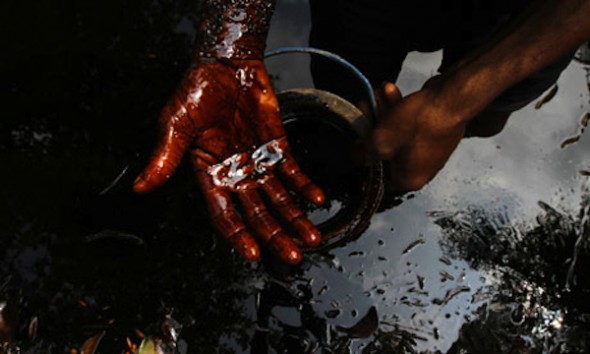
Shell oil activities in Ogoniland in the Niger delta have polluted rivers. Photograph: Akintunde Akinleye/REUTERS
Several damning articles have been been published in The Guardian (U.K.) over the past few days.
Sunday’s headline, Shell oil paid Nigerian military to put down protests, court documents show, gets right to the point.
John Vidal, Environment Editor, writes: “Shell has never denied that its oil operations have polluted large areas of the Niger Delta – land and air. But it had resisted charges of complicity in human rights abuses.
“Court documents now reveal that in the 1990s Shell routinely worked with Nigeria‘s military and mobile police to suppress resistance to its oil activities, often from activists in Ogoniland, in the delta region.
Pipeline oversight: Are independent monitoring panels effective, truly independent?
Over the past few weeks I’ve been scrutinizing documents on the safety and oversight of the Chad-Cameroon pipeline. As I wrote in an initial blog post, the ruptured ExxonMobil pipeline and subsequent oil spill in the Yellowstone River in Montana got me thinking about similarities with the ExxonMobil pipeline that crosses no fewer than 17 major rivers in Cameroon. I then wrote a follow-up post on pipeline oversight (or lack of).
So I was thrilled when I found out that Oxfam America was preparing a new report on the monitoring of controversial oil and gas projects featuring the Chad-Cameroon pipeline as one of its case studies. The report, Watching the Watchdogs, was launched yesterday in Washington, D.C. Among the speakers at yesterday’s panel were Jacques Gérin and Nadji Nelambaye who were both involved with monitoring the Chad-Cameroon pipeline.

